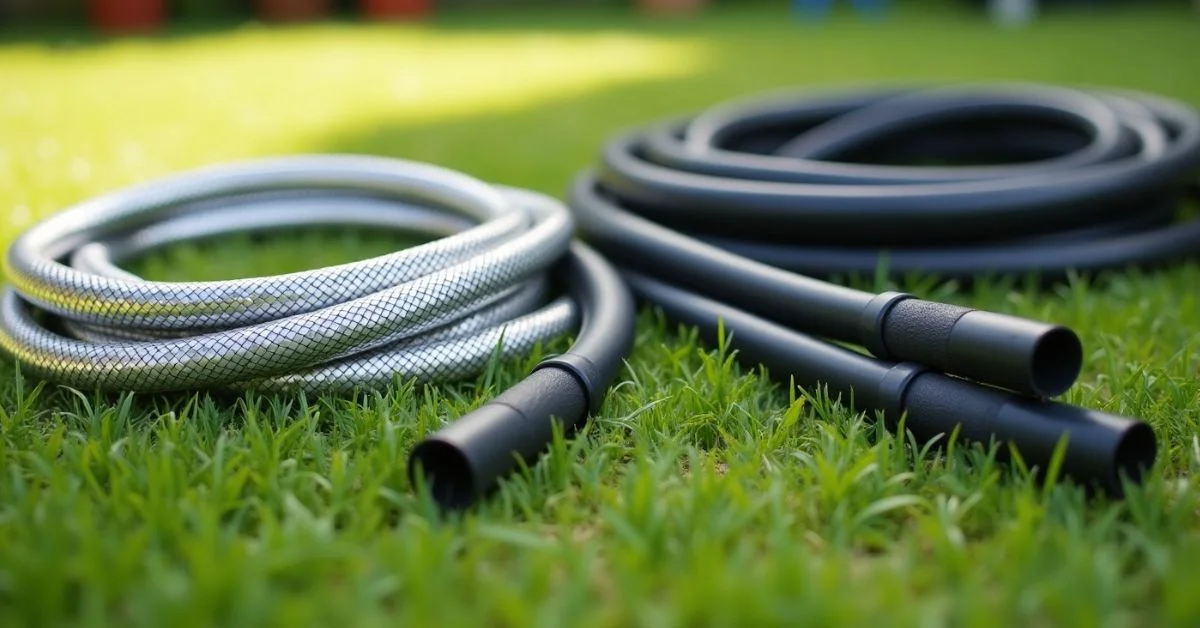Table of Contents
Choosing the right garden hose can save you a lot of time, money, and frustration. Among the many types of hoses available, metal and rubber hoses are two of the most popular options. Both materials offer specific advantages, but they also come with drawbacks. In this guide, we’ll explore the durability of metal versus rubber garden hoses and help you decide which one is right for you.
Why Durability Matters?
When you invest in a garden hose, you expect it to last for years. A durable hose means fewer replacements, fewer leaks, and better performance overall.
Durability affects:
- How long does your hose last
- Resistance to kinks and tangles
- Protection against leaks or bursts
- Performance in extreme weather
If a hose easily cracks, bursts, or wears out, it can be a headache every time you use it. That’s why durability should be a top concern when shopping for a new hose.
What Are Metal Garden Hoses?
Metal garden hoses are usually made from stainless steel. They have a flexible design with a metal outer layer that protects a thin inner tubing, usually made from latex or rubber. These hoses are becoming more popular because of their rugged appearance and promise of long-lasting performance.
1. Pros of Metal Hoses
- Durability: Resistant to punctures, sharp objects, and pets
- UV Resistant: Metal doesn’t degrade in sunlight
- No Kinks: The design makes them almost kink-free
- Rust Resistant: Most are made from stainless steel to avoid corrosion
- Crush-Proof: They won’t collapse under pressure from feet or wheels
2. Cons of Metal Hoses
- Heavier: Though newer models are lightweight, they can still be heavier than rubber
- Less Flexible: They don’t bend as easily around corners
- Heat Conduction: Can become very hot if left in the sun
What Are Rubber Garden Hoses?
Rubber garden hoses are made entirely of synthetic or natural rubber. They’ve been around for a long time and are favored for their flexibility and ease of use.
1. Pros of Rubber Hoses
- Highly Flexible: Easy to move and wind up
- Temperature Resistant: Works well in hot and cold climates
- Durable: Strong against everyday wear and tear
- Great Water Flow: Typically has a wider diameter for stronger water pressure
2. Cons of Rubber Hoses
- Heavy: Rubber is dense and can be tough to carry over long distances
- Can Kink: Though less than vinyl hoses, they still kink
- Wear with Age: Can crack or become brittle over time
- Absorbs UV Rays: May degrade if left in sunlight for long periods
Head-to-Head Durability Comparison
1. Resistance to Physical Damage
Metal hoses are nearly impossible to puncture or tear. If you have pets that chew or thorns in your garden, a metal hose will hold up much better. Rubber hoses, while strong, are more vulnerable to sharp objects.
2. Performance in Hot and Cold Weather
Rubber hoses handle extreme weather better. They stay flexible in freezing temperatures and don’t become brittle. Metal hoses, on the other hand, can become too hot to touch in summer and are prone to stiffening in extreme cold.
3. Longevity
Metal hoses typically outlast rubber ones due to their outer shell. They are rustproof and can handle more abuse. Rubber hoses can also last years, but they require proper care, like storing them out of the sun and draining them before winter.
4. Ease of Use
Rubber hoses are easier to maneuver around the yard, especially in tight corners. Metal hoses don’t kink, but they can be harder to wrap up or pull around obstacles.
5. Kinking and Tangles
Metal hoses are practically kink-proof. Their coiled structure prevents knots. Rubber hoses are less prone to kinks than vinyl hoses but still can tangle if not stored properly.
When Should You Choose a Metal Hose?
A metal hose is a good choice if:
- You need high durability
- Your hose often drags across rough surfaces
- You have pets that chew or gardens with sharp objects
- You want a hose that won’t kink or tangle
- You leave your hose outside year-round
When Should You Choose a Rubber Hose?
Rubber hoses are ideal if:
- You need a very flexible hose
- You use your hose in cold weather
- You prefer a hose that’s easy to coil and store
- You don’t mind storing your hose indoors when not in use
- You’re looking for strong water pressure delivery
Care Tips to Improve Durability. Whether you choose rubber or metal, taking care of your hose extends its life.
- Always drain the hose after use
- Store it in a shaded or indoor area
- Don’t leave it pressurized
- Coil it properly to avoid stress
- Check for leaks or damage regularly
Cost vs value
Metal hoses are usually more expensive upfront, but they tend to last longer and need fewer repairs or replacements. Rubber hoses are more affordable but may wear out sooner, especially if not cared for properly. Consider how often you use your hose and in what conditions to decide what offers the best value.
Conclusion
Both metal and rubber hoses have their strengths and weaknesses. If you prioritize long-term durability and resistance to damage, go with a metal hose. If flexibility and cold-weather performance are more important to you, a rubber hose is your best bet. The best hose for you depends on your specific needs. Either way, with good care and proper use, both types can serve you well for years. Make your decision based on the kind of environment you use your hose in and how often you use it.
The choice between a metal and rubber garden hose comes down to what matters more to you: raw durability or flexible ease of use. Either way, you can’t go wrong if you choose quality and take care of it.








